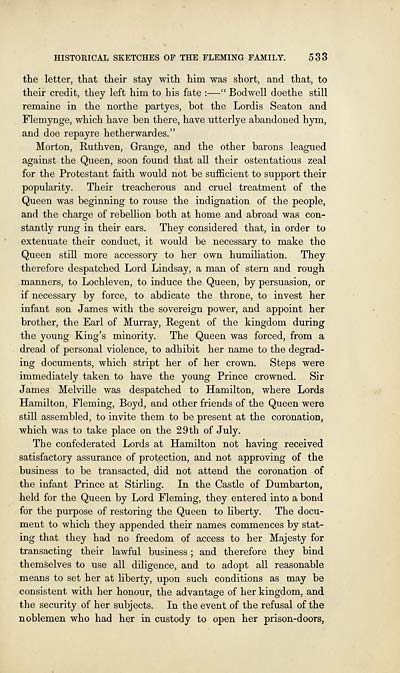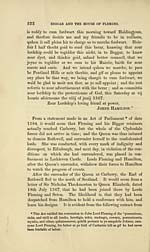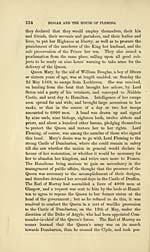Biggar and the House of Fleming
(563) Page 545
Download files
Complete book:
Individual page:
Thumbnail gallery: Grid view | List view

HISTORICAL SKETCHES OF THE FLEMING FAMILY. 533
the letter, that their stay with him was short, and that, to
their credit, they left him to his fate : — •" Bodwell doethe still
remaine in the northe partyes, hot the Lordis Seaton and
Flemynge, which have ben there, have utterlye abandoned hym,
and doe repayre hetherwardes."
Morton, Ruthven, Grange, and the other barons leagued
against the Queen, soon found that all their ostentatious zeal
for the Protestant faith would not be sufficient to support their
popularity. Their treacherous and cruel treatment of the
Queen was beginning to rouse the indignation of the people,
and the charge of rebellion both at home and abroad was con-
stantly rung in their ears. They considered that, in order to
extenuate their conduct, it would be necessary to make the
Queen still more accessory to her own humiliation. They
therefore despatched Lord Lindsay, a man of stern and rough
manners, to Lochleven, to induce the Queen, by persuasion, or
if necessary by force, to abdicate the throne, to invest her
infant son James with the sovereign power, and appoint her
brother, the Earl of Murray, Regent of the kingdom during
the young King's minority. The Queen was forced, from a
dread of personal violence, to adhibit her name to the degrad-
ing documents, which stript her of her crown. Steps were
immediately taken to have the young Prince crowned. Sir
James Melville was despatched to Hamilton, where Lords
Hamilton, Fleming, Boyd, and other friends of the Queen were
still assembled, to invite them to be present at the coronation,
which was to take place on the 29 th of July.
The confederated Lords at Hamilton not having received
satisfactory assurance of protection, and not approving of the
business to be transacted, did not attend the coronation of
the infant Prince at Stirling. In the Castle of Dumbarton,
held for the Queen by Lord Fleming, they entered into a bond
for the purpose of restoring the Queen to liberty. The docu-
ment to which they appended their names commences by stat-
ing that they had no freedom of access to her Majesty for
transacting their lawful business ; and therefore they bind
themselves to use all diligence, and to adopt all reasonable
means to set her at liberty, upon such conditions as may be
consistent with her honour, the advantage of her kingdom, and
the security of her subjects. In the event of the refusal of the
noblemen who had her in custody to open her prison-doors,
the letter, that their stay with him was short, and that, to
their credit, they left him to his fate : — •" Bodwell doethe still
remaine in the northe partyes, hot the Lordis Seaton and
Flemynge, which have ben there, have utterlye abandoned hym,
and doe repayre hetherwardes."
Morton, Ruthven, Grange, and the other barons leagued
against the Queen, soon found that all their ostentatious zeal
for the Protestant faith would not be sufficient to support their
popularity. Their treacherous and cruel treatment of the
Queen was beginning to rouse the indignation of the people,
and the charge of rebellion both at home and abroad was con-
stantly rung in their ears. They considered that, in order to
extenuate their conduct, it would be necessary to make the
Queen still more accessory to her own humiliation. They
therefore despatched Lord Lindsay, a man of stern and rough
manners, to Lochleven, to induce the Queen, by persuasion, or
if necessary by force, to abdicate the throne, to invest her
infant son James with the sovereign power, and appoint her
brother, the Earl of Murray, Regent of the kingdom during
the young King's minority. The Queen was forced, from a
dread of personal violence, to adhibit her name to the degrad-
ing documents, which stript her of her crown. Steps were
immediately taken to have the young Prince crowned. Sir
James Melville was despatched to Hamilton, where Lords
Hamilton, Fleming, Boyd, and other friends of the Queen were
still assembled, to invite them to be present at the coronation,
which was to take place on the 29 th of July.
The confederated Lords at Hamilton not having received
satisfactory assurance of protection, and not approving of the
business to be transacted, did not attend the coronation of
the infant Prince at Stirling. In the Castle of Dumbarton,
held for the Queen by Lord Fleming, they entered into a bond
for the purpose of restoring the Queen to liberty. The docu-
ment to which they appended their names commences by stat-
ing that they had no freedom of access to her Majesty for
transacting their lawful business ; and therefore they bind
themselves to use all diligence, and to adopt all reasonable
means to set her at liberty, upon such conditions as may be
consistent with her honour, the advantage of her kingdom, and
the security of her subjects. In the event of the refusal of the
noblemen who had her in custody to open her prison-doors,
Set display mode to:
![]() Universal Viewer |
Universal Viewer | ![]() Mirador |
Large image | Transcription
Mirador |
Large image | Transcription
Images and transcriptions on this page, including medium image downloads, may be used under the Creative Commons Attribution 4.0 International Licence unless otherwise stated. ![]()
| Histories of Scottish families > Biggar and the House of Fleming > (563) Page 545 |
|---|
| Permanent URL | https://digital.nls.uk/94846038 |
|---|
| Description | A selection of almost 400 printed items relating to the history of Scottish families, mostly dating from the 19th and early 20th centuries. Includes memoirs, genealogies and clan histories, with a few produced by emigrant families. The earliest family history goes back to AD 916. |
|---|

